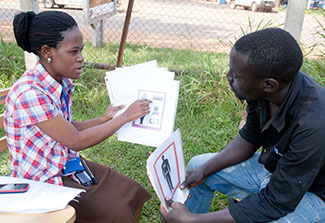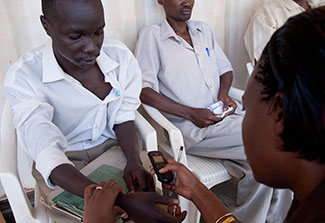
Fogarty program develops bioethics expertise in Uganda
September / October 2016 | Volume 15, Number 5

Photo by Richard Lord for Fogarty
Bioethics training in Uganda includes consideration of
ensuring informed consent for research subjects with
low literacy.
ensuring informed consent for research subjects with
low literacy.
As the HIV/AIDS epidemic took hold in Africa in the 1990s, researchers studying ways to treat and prevent the disease struggled with the ethical questions involved. Was it appropriate to use placebos in trials of drugs that were already proven effective in high-income countries? How could they ensure research subjects were not unduly influenced into participation when the alternative in many cases was no treatment at all? How could investigators clearly communicate the potential risks to populations with little education and low literacy?
After consultations with the research community, Fogarty launched a bioethics research and training program in 2000 aimed at building capacity in Africa and other low- and middle-income countries. Since then, hundreds of academics, scientists and health officials have developed expertise to address the issues affecting their populations in the context of their own culture and research environment.
Ugandans were quick to participate in the master’s-level bioethics programs Fogarty supported at institutions in the U.S., Canada and South Africa. And when the trainees returned home, they began working as a team to develop a national bioethics framework for Uganda, which is now the third largest destination for clinical trials in Africa.
“Fogarty trainees have been very active in developing the research ethics landscape in Uganda,” says Dr. Julius Ecuru, Assistant Executive Secretary of the Uganda National Council for Science and Technology (UNCST), the government agency that oversees research and development. With Fogarty support, he earned a postgraduate diploma in international research ethics from the University of Cape Town in 2005. He says the experience gave him the inspiration to help bring about many of the reforms that have been instituted in his country.
Although regulation of research in Uganda began in 1970 with formation of the National Research Council, comprehensive national guidelines were not adopted until 1997, to meet the increased demand for review and regulation driven largely by HIV trials. With new issues emerging, and in-country ethics experts now available to consider them, the policies were revised and expanded in 2007 and 2014.
“We felt the guidelines must be driven by some kind of value judgment,” Ecuru explains “Every statement we put in there has an ethical justification of why it is there.”

Photo by Richard Lord for Fogarty
With Fogarty support, Uganda’s Makerere University has
developed a cadre of bioethics experts and now offers a
master’s degree program tailored to the national context
and research priorities.
developed a cadre of bioethics experts and now offers a
master’s degree program tailored to the national context
and research priorities.
The framework spells out the process for obtaining informed consent from a participant or their representative, and outlines how to address care during and after the trial, along with compensation for any research-related injuries. Recognizing the cultural value attached to biological samples, such as blood and saliva, a separate consent form for samples is required and a materials transfer agreement must be put in place when specimens are sent somewhere else for testing or storage. The guidelines also define how to approach traditional and complementary medicine, requiring that the indigenous knowledge of communities be acknowledged.
Research ethics committees and institutional review boards have been established throughout Uganda to consider proposed research approaches and monitor activities. Candidates to fill these critical positions must complete ethics instruction and be accredited by the government.
In the first decade of the Fogarty bioethics program, nine Ugandans from Makerere University traveled abroad for master’s level training. They studied the principles of ethics, international guidelines, research methodologies and other topics. They were also immersed in the practical application of coursework, by observing IRBs in action and developing case studies relevant to the research issues they were facing at home. Throughout the process, they were mentored by experienced bioethicists.
Seven faculty with substantial training returned to Uganda and formed the core leadership for bioethics in the country. In addition to helping shape national guidelines, they develop workshops and short courses to expand the number of experts in human research protection, responsible conduct of research, clinical ethics and research ethics. They also assistend in organizing national and regional conferences to share information and build capacity.
In 2014, Makerere had developed sufficient bioethics expertise to successfully compete for its own Fogarty bioethics grant, partly supported by the National Institute of Allergy and Infectious Diseases (NIAID) and the National Human Genome Research Institute (NHGRI). That funding allowed Makerere to expand activities and establish its own bioethics master’s degree program, greatly increasing the reach and sustainability.
Researchers no longer have to leave the country, or learn from a foreign trainer who comes in and teaches with examples from elsewhere, explains Dr. Joseph Ochieng, who was one of the first Ugandans to receive bioethics training. Ochieng, an anatomy professor at Makerere, received a master’s in bioethics from the University of Toronto in 2002 with Fogarty support, and continues to be heavily involved in bioethics.
“We are training individuals in the context of Uganda, in the context of where they live and practice, so they connect much better,” Ochieng says, noting the approach also reduces brain drain and is cost-effective. “The only sustainable way you can do it adequately is by training locally. You can train more people with less funds.”
Under the program, bioethics short courses have been presented to several hundred individuals, case studies specific to Uganda have been developed and online training tools are being produced, which will reduce costs and increase capacity. In addition to supporting trainees’ participation in national and international research ethics conferences, the grant also helps fund the study of emerging issues such as genetics research in Africa. To coordinate all the activities, Makerere has established a bioethics center that will provide leadership to facilitate scientific discovery, while protecting human subjects and ensuring ethical standards are upheld.
“Strengthening research ethics has given us a good environment to support quality research,” Ecuru says. “Our regulatory system should not be a hindrance to scientific progress. Rather, we want scientific progress that also ensures respect for human participants and causes less harm to participating communities.”
More Information
- About Fogarty's International Bioethics Training programs
- Bioethics news and resources for investigators, committees, students, teachers and more from Fogarty
- About the International Health Research Ethics Training Program, the Fogarty-supported bioethics program at Makerere University
- Ethics of Clinical Research: Multinational Research and Capacity Building, a collection of papers on Fogarty bioethics grantees and trainees
Journal of Empirical Research on Human Research Ethics, December 2013 and April 2014 issues - Grantee news: Bioethics training programmes for Africa: evaluating professional and bioethics-related achievements of African trainees after a decade of Fogarty NIH investment
BMJ Open, September 15, 2016
To view Adobe PDF files, download current, free accessible plug-ins from Adobe's website.





















.png)












No hay comentarios:
Publicar un comentario